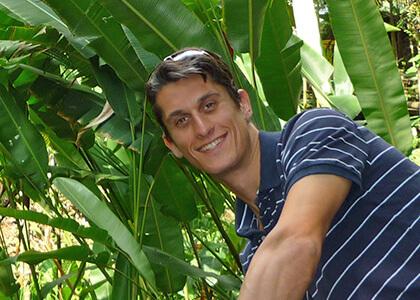While earning his B.S. in biology and environmental studies at Warren Wilson College in North Carolina, Ryan Morra heard about the Rubenstein School. “I heard that RSENR was a forward-thinking school and that it engaged its students in real-world learning.” He chose to earn his master’s degree through the Rubenstein School’s Ecological Planning curriculum because of its long reputation for excellent field-based, hands-on, relevant learning that prepares students for professional environmental careers.
Ryan grew up in southwestern Connecticut then moved to Washington, DC, where he worked on and led community service projects throughout the U.S. with Americorps NCCC, a national program for 18-24-year-olds. After earning his B.S., Ryan went on to obtain his teaching license through a fellowship at Eagle Rock School and Professional Development Center in Colorado. He later secured a teaching position with Big Picture South Burlington, an innovative, internship-based learning program at South Burlington High School in Vermont. Desiring to further develop his teaching skills, Ryan built his master's project around environmental education.
“As a former high school science teacher, I wanted to become more fluent in the natural history of the region and gain the skills needed to get my students learning outside. I focused on developing my skills as a naturalist and on creating place-based learning opportunities for students.”
For his master’s project, Ryan developed a place-based education program with the community of Adjuntes, Puerto Rico, modeled after the PLACE Program, a partnership between Shelburne Farms and the University of Vermont. The PLACE Program uses an integrative landscape framework that combines the physical landscape (geology, soils, climate), the cultural landscape (indigenous and colonial histories, modern culture), and the ecological landscape (plants and wildlife) to more holistically understand a particular place. This integrated understanding is used to educate the public and galvanize the community to action in engaging with their place.
Ryan’s current position as the Education for Sustainability Partnerships Coordinator and Educator at Shelburne Farms in Vermont grew directly out of his master’s project. He designs and implements professional development programs for educators around sustainability and place-based education. He runs workshops for teachers, helps schools with curriculum design, and collaborates with other non-profit organizations on national initiatives. He is also one of the lead educators for the farm- and forest-based education programs for elementary school students and collaborates regularly with high schools and colleges.
“My hope is that through my work I can help transform public education in such a way that all students are engaging in and learning about sustainability throughout their whole K-12 experience.”
